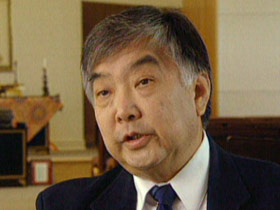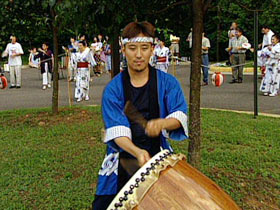In This Episode << SLIDE LEFT TO SEE ADDITIONAL SEGMENTS
Buddhist Obon Festival
BOB ABERNETHY, anchor: For Japanese-American Buddhists, last weekend was the Feast of Lanterns, when Buddhists pay special tribute to the dead. It’s called Bon or Obon, and our guides were the Nakamuras — Ken, Nori, and their children, Maya and Greg — at the Shin Buddhist temple in northern Virginia, where the ashes of forebears are kept.

KEN NAKAMURA (Shin Buddhist): Bon as it’s pretty much observed around the temples in the United States is a two-day celebration. The Bon dance is usually first, and the Bon service is the next.
The sense of ancestor worship is not carried forth as much here in the United States. We’ve lost that aspect of ancestor worship that was part of the amalgamation of Buddhism as it is celebrated in Japan.
When we celebrate Bon, we don’t think of spirits coming back. We think of it as a memorial service, a time to remember those who have passed on.
GREG NAKAMURA: For me, Obon — and whether it’s the dance or the service — it’s just a reminder that we are here because of our ancestors, because of the way that they chose to live their lives, the way they taught us. It’s a reminder that they continue to live on through our actions.
Mr. NAKAMURA: We have this board that people can put the memorial plaques or the Buddhist name that’s given at the time of the person’s death.
NORI NAKAMURA: For those who have worked very hard for the Buddhist church, we are given a special title called “ingo.”

Mr. NAKAMURA: We call ourselves “householder Buddhists” because we don’t have a monastic tradition. We are very much involved in the life we lead, which includes ego, self, ambition, attachments, love for family. You could no more ignore your family and cut them off than if you could stop them breathing.
MAYA NAKAMURA: When people die that are close to you, you feel the grieving and you feel the pain. But you also remember the Buddhist teachings of impermanence and interdependence.
Mr. NAKAMURA: The more popular sense of reincarnation is that there is a spirit that transmigrates upon death from one entity to another. The way we look at reincarnation is not so much the transmigration of a spirit, but the sense that we, in our daily lives, go up and down this whole realm.
We can be really, really greedy or attached to something, and that throws us into the realm of the hungry spirits. If a person suffers from road rage, they’re in the realm of the fighting spirits.
Sometimes we can be really, really good and do something that’s fantastic without any thought of how my ego’s involved, and that becomes the realm of the Buddha.
In our lives, we go up and down this whole realm of existences, and it can change from moment to moment. The hard part is to hit that realm of the Buddha and stay there.

